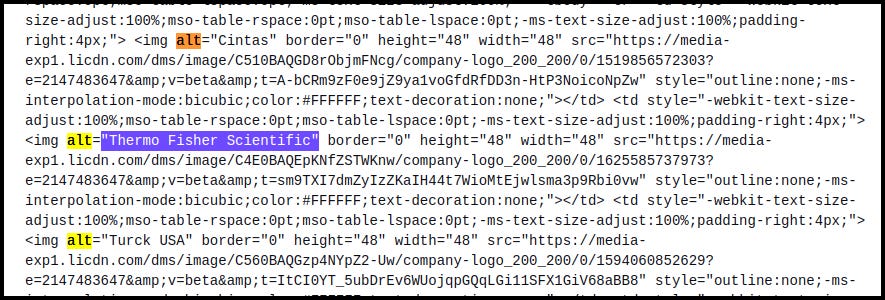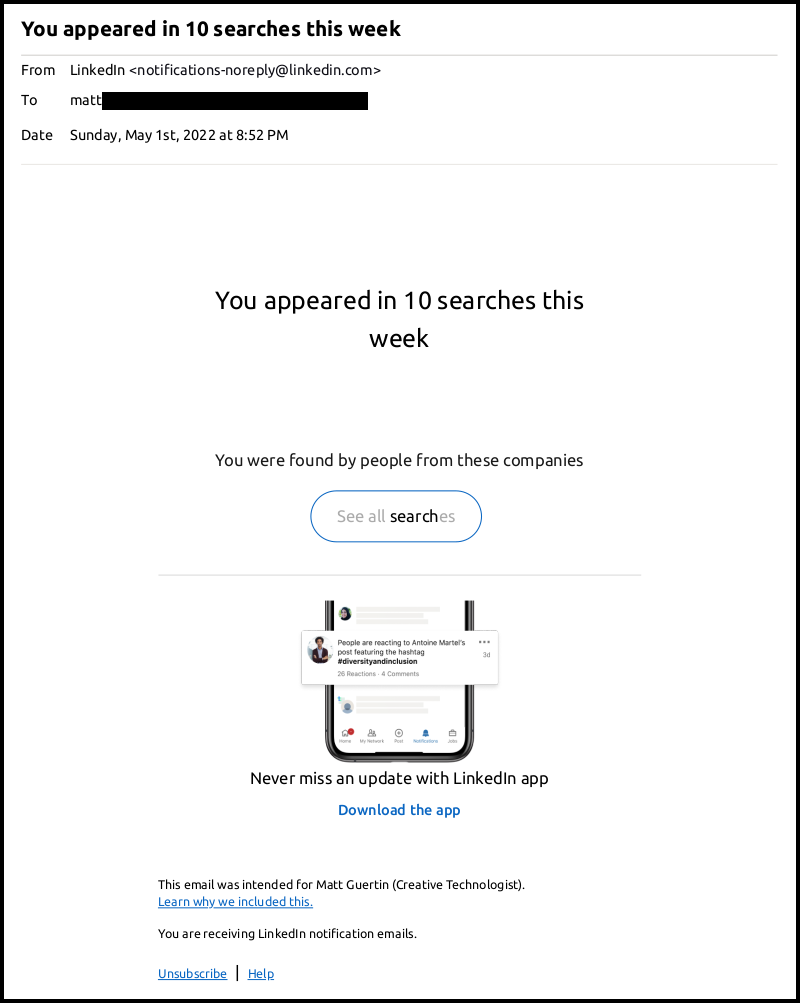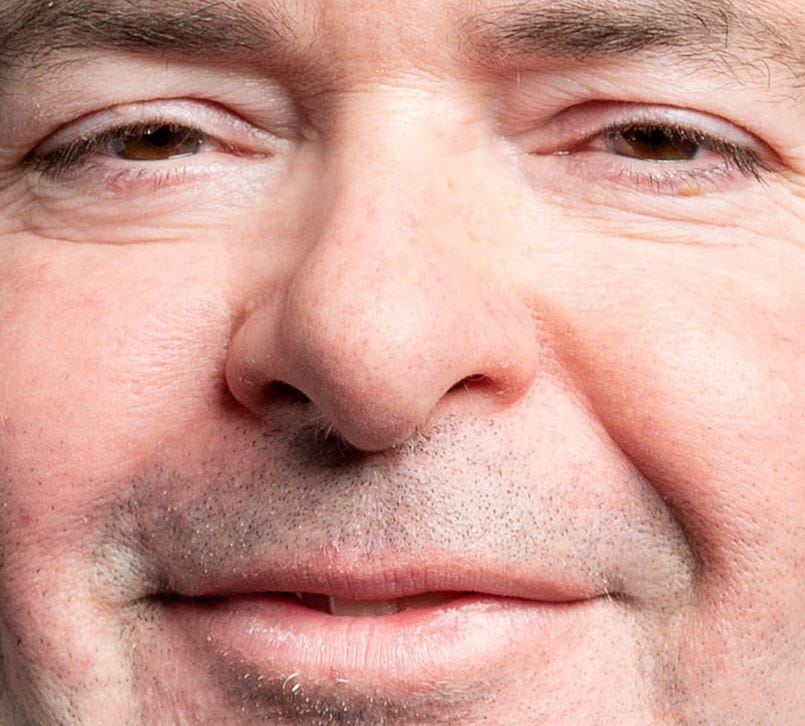5/1/22 | Thermo Fisher Scientific *SEARCH*
'signed an agreement with the Institute of Pathology Heidelberg (IPH) to establish its Center of Molecular Pathology at Heidelberg University Hospital'
Thermo Fisher Scientific Inc.
is an American supplier of analytical instruments, life sciences solutions, specialty diagnostics, laboratory, pharmaceutical and biotechnology services.
Marc N. Casper
is Chairman, President and Chief Executive Officer of Thermo Fisher Scientific.[72]
https://www.weforum.org/people/marc-n-casper/
Marc Casper is Chairman, President and Chief Executive Officer of Thermo Fisher Scientific the world leader in serving science. He leads more than 100,000 colleagues globally to fulfill the company’s mission of enabling its customers to make the world healthier, cleaner and safer.
He joined Thermo Electron Corporation in 2001 as President of the Life Sciences sector. He was named Senior Vice President in 2003, and in 2005 assumed responsibility for all of the company’s operating divisions. After the merger creating Thermo Fisher Scientific in 2006, Marc was named Executive Vice President and President of its Analytical Technologies business, and in 2008 he became the company’s Chief Operating Officer.
Prior to joining Thermo Fisher, Marc served as President, Chief Executive Officer and a Director of Kendro Laboratory Products. Previously, he worked for clinical diagnostics provider Dade Behring Inc., serving as President–Americas. Marc began his career as a strategy consultant at Bain & Company and later joined Bain Capital. (link to Bain and Company searching for my LinkedIn profile)
Marc is Chairman of the U.S. – China Business Council and serves on the boards of Mass General Brigham, Synopsys, Inc., and Wesleyan University. Previously, he was a director of the Advisory Board Company, Brigham & Women’s Hospital (link to Brigham & Women’s Hospital searching for my LinkedIn profile) Zimmer Holdings and U.S. Bancorp. Marc earned an MBA with high distinction from Harvard Business School and is a graduate of Wesleyan University, where he received a bachelor’s degree in economics.
https://www.ced.org/people/single/marc-n.-casper1
In 2021, Thermo Fisher announced the construction of a cell therapy development, manufacturing and collaboration center in cooperation with University of California, San Francisco on the school's Mission Bay campus.[19]
According to company figures, 46% of its sales are in life sciences
In May 2011, Thermo Fisher Scientific Inc. bought Phadia to expand into the testing of allergies and autoimmune diseases for €2.47 billion ($3.5 billion) in cash.[23]
In April 2013, after a competitive bidding with Hoffmann-La Roche,[24] Thermo Fisher acquired Life Technologies Corporation for US$13.6 billion in a deal, adding further service lines related to advanced DNA sequencing and genetic testing.[25]
In February 2015, the company announced it would acquire Advanced Scientifics for $300 million in a cash-deal. ASI designs manufactures, and delivers technologies used in bioprocessing.[26]
In January 2016, the company announced it would acquire Affymetrix for $1.3 billion.[29] On May 27, 2016, the company announced it would acquire FEI Company for $4.2 billion, a manufacturer of electron microscopes.[30][31] This acquisition is anticipated to close in early 2017 and will contribute to the growth of Thermo's Analytical Instruments business group.[32] In November the company announced it would acquire MTI-GlobalStem, a previously privately held company that develops reagents for cell transfection, neurobiology and stem cell research.[33]
In February 2017, the company acquired Finesse Solutions, Inc., developer of scalable control automation systems and software for bioproduction after receiving early termination of the waiting period under the Hart-Scott-Rodino Antitrust Improvements Act.[34] The transaction was completed a day later.[35] In March, the company announced it would acquire Core Informatics, provider of cloud-based platforms supporting scientific data management.[36] In August, the company acquired Patheon, a contract development and manufacturing organization serving the pharmaceutical and biotechnology sectors, for approximately $7.2 billion.[37] As of 2017, the company had revenues of $20.9 billion, and was a Fortune 500 company.[38]
In September 2018, Thermo Fisher Scientific announced it had signed a definitive agreement with Becton, Dickinson and Company (BDX) to acquire their Advanced Bioprocessing business. This BD business had annualized revenue of approximately $100 million; as of October 16, 2018, it had been integrated into Thermo Fisher's Life Sciences Solutions Segment.[39]
In March 2019, Thermo Fisher Scientific announced its entry into the gene therapy manufacturing market with a $1.7 billion cash acquisition for Brammer Bio.[40][41][42] In May 2019, Thermo Fisher Scientific partnered with MMJ International Holdings to manufacture drug products developed by MMJ for the treatment of multiple sclerosis and Huntington's disease.[43][44] In June, the business announced it would acquire mass spectrometry software provider, HighChem.[45]
In March 2020, Thermo Fisher Scientific agreed to purchase Qiagen, a molecular diagnostics company, for $10.1 billion.[46] In July, the offer for Qiagen was raised from €39 to €43 per share (€11.3 billion in total).[47][48] On August 13, the company announced that its offer to acquire all of the ordinary share had lapsed, and it terminated the acquisition agreement.[49]
In August 2020, Thermo Fisher Scientific opened its new Lenexa facility aimed at boosting the production and manufacturing of COVID-19 testing supplies.[50] In December the business announced it would acquire Phitonex, Inc.[51]
In January 2021, Thermo Fisher Scientific announced it had acquired Belgium-based viral vector manufacturer, Henogen SA, from Groupe Novasep SAS for €725 million in cash[52][53][54] and Mesa Biotech, Inc. for up to $550 million.[55][56]
In April 2021, Thermo Fisher Scientific announced the acquisition of PPD, Inc., a contract research organization, for a total cash purchase price of $17.4 billion-plus the assumption of approximately $3.5 billion of net debt. PPD generated $4.7 billion in revenue during FY 2020, and this transaction, which values their company at approximately $20.9 billion.[57] In November, the business announced it would acquire PharmaFluidics and its μPAC range of micro-chip-based chromatography products.[58]
In October 2022, the company agreed to buy British diagnostics firm, The Binding Site Group, in an all-cash deal for US$2.6 billion from Nordic Capital.[59][60] The acquisition completed in January 2023.[61]
In July 2023, the business announced it would acquire CorEvitas, LLC from Audax Private Equity for more than $900 million in cash.[62] In August 2023, it was announced Thermo Fisher had completed the acquisition for $912.5 million (in cash).[63]
In October 2023, Thermo Fisher Scientific acquired Olink Holding for $3.1 billion.[64]
Research partnership
In September 2017, Thermo Fisher Scientific signed an agreement with the Institute of Pathology Heidelberg (IPH) to establish its Center of Molecular Pathology at Heidelberg University Hospital as the newest member of the Next Generation Sequencing Companion Dx Center of Excellence Program (COEP). The initiative focuses on establishing strategic collaborations with leading, European-based organizations that can lead studies using Thermo Fisher's Oncomine portfolio of research panels destined for development as companion diagnostics to help drive precision oncology in the region.[73]
COVID-19 Response
In March 2020, Thermo Fisher Scientific received emergency use authorization from the FDA for a test for SARS-CoV-2 to help mitigate the COVID-19 pandemic.[74]
Controversies
Xinjiang
In February 2019, Thermo Fisher Scientific announced that it would stop selling its equipment in Xinjiang.[75] In June 2020, Thermo Fisher Scientific was reported to sell its equipment to security services in China for use in what was alleged as part of a genetic surveillance program.[76] A report from the Australian Strategic Policy Institute found that Thermo Fisher Scientific collaborated with the Chinese Ministry of Public Security to develop a Huaxia PCR amplification kit specifically to identify the genotypes of Uyghur, Tibetan and Hui ethnic minorities.[77] In June 2021, The New York Times reported that, despite bans, Thermo Fisher Scientific equipment continued to be sold to police in Xinjiang.[78]
HeLa cells
In October 2021 the estate of Henrietta Lacks sued to get past and future payment for the alleged and widely known unauthorized sale by Thermo Fisher Scientific of her HeLa cells which are essential in many types of research.[79] Over 50 million tons of her cells have been produced and used in over 60,000 scientific studies touching virtually every realm of medicine, including the development of polio vaccines, gene mapping, in-vitro fertilization, and multitudes more.[80][81][82]
In May 2022, it was announced Thermo Fisher Scientific went to court to seek a dismissal of the lawsuit.[83] In late July 2023, with the motion to dismiss still outstanding, the court ordered the parties to attend a settlement conference.[84][85] Soon after that, settlement of the suit, with undisclosed terms, was announced.[86]
Mexican plant
In 2013, Opengate Capital Group LLC filed suit against Thermo Fisher Scientific for selling it a manufacturing plant controlled by a drug cartel. According to Opengate Capital, the company withheld important documents and pressured employees into concealing the presence of the gang.[87][88]
Tibet
In 2022, following reports that Thermo Fisher Scientific had sold products to police in the Tibet Autonomous Region,[89] the Inter-Parliamentary Alliance on China called on governments to "investigate and suspend commercial activities with companies providing the PRC government with technologies to carry out biometric surveillance in the Uyghur Region, Tibet and elsewhere in the PRC, including the PRC state backed BGI Group and US firm Thermo Fisher."[90]









